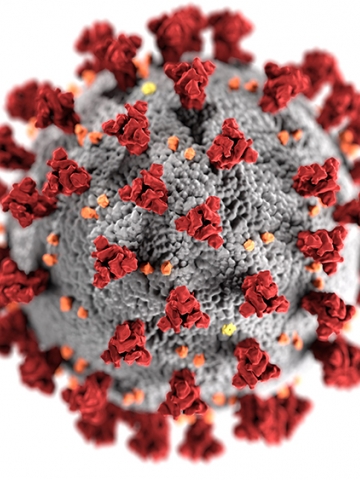Article |
Two Pandemics
Inequalities across race and class in Chicago exposed with Covid-19 pandemic

Of the many societal problems that the COVID-19 pandemic has brought to the fore, inequality is perhaps the most striking. In Chicago, the contrast between rich and poor seems especially sharp: low-income Black neighborhoods have seen far more cases and received far fewer vaccine doses than affluent white neighborhoods. Of the first 100 Chicagoans to die of the virus, seventy were Black.
Dr. Doriane Miller, MD, has witnessed these inequities firsthand. For more than twenty years, the general internist and associate professor in the University of Chicago Department of Medicine has provided care to underserved minority populations and conducted research on the intersection of health disparities and race. As Director of the Center for Community Health and Vitality in UChicago Medicine’s Urban Health Initiative, Dr. Miller works with fellow physicians, educators, and members of the South Side community to improve the health of its residents.
Over the winter, as she and her patients battled the virus, Dr. Miller recruited a team of experts from UChicago Medicine to address its disproportionate impact on communities of color for a roundtable discussion series sponsored by the University of Chicago Graham School of Continuing Liberal and Professional Studies. In three hour-long panel discussions moderated by Dr. Miller and Professor Emily Osborn, Associate Professor of African History, African Studies, and the College and Interim Dean of the Graham School, participants explained the pandemic from their unique vantage in the healthcare field. The series considered COVID-19 and community health from a broad range of perspectives because the complexity of the pandemic’s effects on communities demands such an approach.
“In addition to COVID-19, communities of color are experiencing a wave of grief and loss,” Dr. Miller explains. “We have seen a tremendous uptick in anxiety, depression, and substance abuse, especially in young people. It’s what Dr. Dinizulu talked about in her speech: a syndemic, or the synergistic interaction of two pandemics happening at the same time.”
In addition to COVID-19, communities of color are experiencing a wave of grief and loss...it's a syndemic, or the synergistic interaction of two pandemics happening at the same time.
Dr. Sonya Dinizulu, PhD, Assistant Professor of Psychiatry and Behavioral Neuroscience in the Department of Medicine, explored syndemics on her panel with Dr. Sola Olopade, MD, MPH, Professor of Medicine and Dean for Academic Affairs. Over the past year, as Dr. Dinizulu noted in her presentation, Black Americans have experienced race-based traumatic stress that can manifest in physical symptoms and exacerbate chronic illnesses, like pulmonary conditions, which Dr. Olopade specializes in treating.
Another panel delved into health’s social determinants and the ways that the pandemic has exacerbated existing disparities in healthcare. Drawing on her research on diabetes in Latino communities, Dr. Arshiya Baig, MD, MPH, discussed the pandemic’s cascading effects on low-income Latinos she serves. Dr. Daniel Johnson, MD, Professor of Pediatrics, brought to light the pandemic’s harm to children.
In their session, Dr. William Parker and Dr. Stephen Weber discussed COVID-19 and its effects on patient care and hospital operations at the University of Chicago Medical Center (UCMC). Dr. Weber, Chief Medical Officer and Vice President for Clinical Effectiveness at UCMC and the medical director of Infection Control and Clinical Quality, explained the toll of the pandemic on hospital operations, while Dr. Parker, a pulmonologist and bioethicist, related his experiences on the frontlines of patient care.
Professor Emily Osborn, the Interim Dean of the Graham School who helped organize the program, praised the partnership between Graham and the University of Chicago Medical Center, as well as the broad audience that the series attracted. She sounded particular appreciation for the opportunity to work with Dr. Miller, and the rest of the doctors who participated, all of whom spoke with such clarity and compassion about complex and difficult topics.
“It shows there's a bright future in terms of how we can serve as a platform for faculty and departments and programs around the university. This series, "Pandemic Effects: Community Healthcare," which was recorded and is available online, helps bridge the gap between the University of Chicago campus and medical center and the wider world.,” she says. The Healthcare Roundtable is part of the Graham School’s robust free @Graham programming.
“I see the Graham School as the front door of the university. To be an effective front door—one that is wide and welcoming—then it’s important that we are also good neighbors,” Osborn says.”We strive to offer useful insights and information and to serve as a resource for our neighbors on the South Side. We can share institutional expertise in ways that help people. It's not only an opportunity for us, it's an obligation.”


